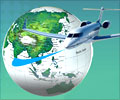The United Nations World Tourism Organisation (UNWTO) has revealed that world tourism rebounded strongly this year from the global financial crisis

International tourist arrivals totaled 421 million in the first six months of 2010, up 7.0 percent on last year but still 2.0 percent below the record year of 2008, the UNWTO said in a report.
The results follow "one of the toughest years for the tourism sector" in 2009, when tourist arrivals declined by 4.2 percent following the global financial meltdown.
It noted that growth was modest in April due the closure of European airspace following the eruption of the volcano in Iceland, but results were strong in May and June.
"Growth was positive in all world regions, led by a robust performance of emerging economies, expanding at 8.0 percent compared to 6.0 percent in advanced economies."
Asia and the Pacific, where tourist arrivals were up 14 percent, and the Middle East, where the figure was 20 percent, "continue to lead growth in the first half of 2010 with the majority of destinations in both regions posting double digit growth rates.
Advertisement
Tourism in the Americas was up 7.0 percent, and Europe 2.0 percent.
Advertisement
"In many advanced economies, namely in the USA and in some major European markets, economic recovery has still to consolidate," he was quoted as saying in a UNWTO statement.
"To this we must add the recent introduction and increase in taxation, most specifically those which directly impact the tourism sector, such as air transport taxes."
For the whole of 2010, the body maintained its forecast of 3.0 to 4.0 percent growth in international tourism.
"Current growth rates, coupled with an improving global economic environment suggest that end-year results are likely to be closer to 4.0 percent, and may even exceed this figure.
"However, high unemployment continues to be a major cause of concern and the austerity measures as well as the rise in taxation implemented in several advanced economies to fight public deficits represent a clear challenge to many leading outbound markets."
Source-AFP








